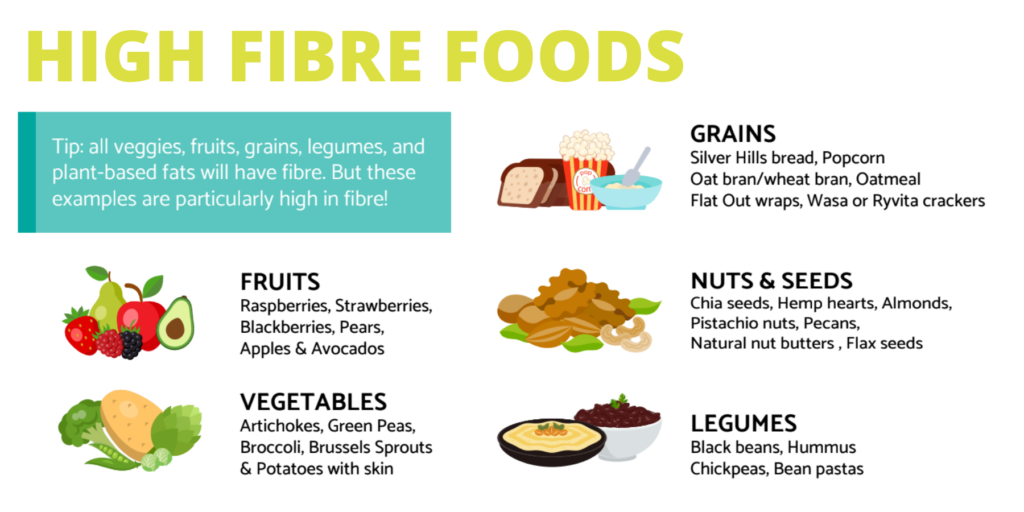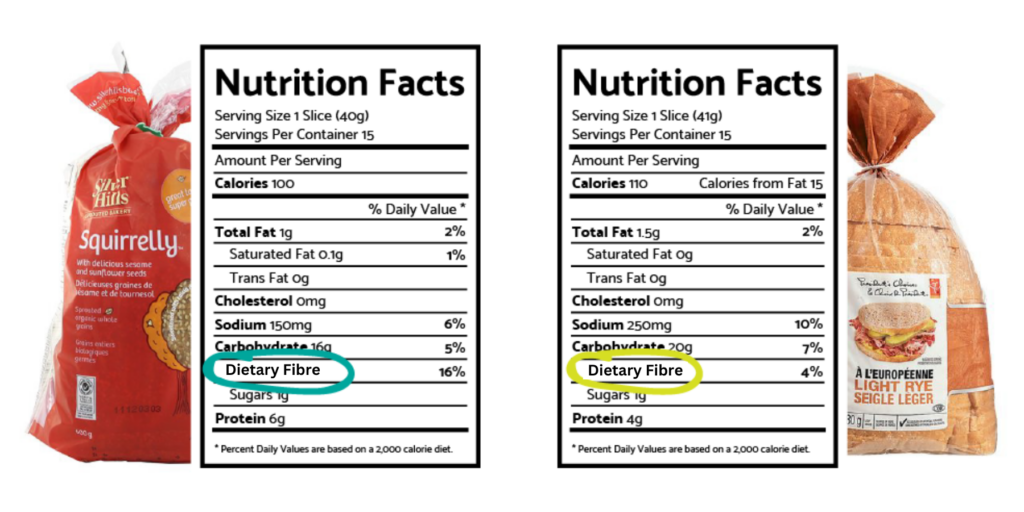Eating for Gut Health – Nutrition Month
March is Nutrition Month, the perfect time to focus on healthy eating habits and lifestyle choices. The 2023 theme is unlocking the potential of food, reminding us that by making simple changes to our diets, we can improve our overall health and well-being, prevent chronic diseases, and support sustainable food systems.
A dietitian can provide trustworthy nutrition information, help you build confidence in your food skills, and address the external influences that might be impacting your food decisions. Throughout the month of March, we’ve partnered with Vitality Nutrition‘s Registered Dietitian Courtney Berg to share her best tips to help you improve your overall diet and maintain a healthy lifestyle. Click here to meet Courtney.
Eating for gut health
Are you looking to improve your gut health but don’t know where to start? Consider these five tips from a Registered Dietitian to improve your digestion!
1. Eat plenty of fibre
It’s common knowledge that fibre is beneficial for good digestion. Fibre supports gut health in two ways:
- Fibre adds bulk to stool which promotes regular bowel movements
- Fibre promotes the growth of beneficial gut bacteria
Soluble and insoluble fibre are two types of fibre found in vegetables, fruits, whole grains, pulses, nuts and seeds, and starches like potatoes.

You can increase your intake of soluble and insoluble fibre by adopting one or more of the following habits:
- Add vegetables and/or fruit to your meals and snacks whenever possible
- Choose whole food, plant-based fats more often (eg. chia seeds, flaxseeds, peanut butter, nuts and seeds, avocado, dark chocolate, olives, or dips like hummus and
guacamole) - Add pulses and legumes to your meals and snacks (eg. canned beans, roasted chickpeas, hummus, and more)
- Choose whole grains (eg. oats, barley, quinoa, brown rice, sprouted grain breads, multigrain wraps, air-popped popcorn, and more)
- Read Nutrition Facts tables to choose products with more fibre (see the example pictured below!)

2. Stay hydrated
Fluid lubricates the digestive tract to assist in regular bowel movements. Most adults benefit from consuming between 2-3 liters of water each day. You may need additional fluid if you
are active, in a hot climate, or have a high fibre intake. Registered Dietitians recommend choosing water for the majority of your fluid intake.
3. Eat fermented foods that contain beneficial bacteria
Fermented foods contain beneficial bacteria that enhance the diversity of the gut microbiome and decrease markers of inflammation in the gut.
Some examples of fermented foods include:
- Yogurt
- Kefir
- Unpasteurized sauerkraut
- Kimchi
- Kombucha
- Tempeh
Dietitian Tip: Make a gut-supportive smoothie by combining fibre-rich foods like fruits and seeds (eg. frozen berries, banana, frozen avocado, chia seeds, flax seeds and others) alongside Greek yogurt or kefir for a boost of beneficial live microorganisms!
FAQ: Should I supplement with probiotics?
Probiotic supplements are intended to treat specific conditions and are not recommended as a general supplement to support digestion. Your doctor or dietitian can help you choose the right probiotic if supplementation is recommended for your unique condition. In most cases, Registered Dietitians recommend fermented foods rather than supplementation to support the
growth of beneficial gut bacteria.
4. Consume foods that contain prebiotics
Prebiotics are types of resistant starches and fibres that fuel the beneficial bacteria. In other words, prebiotics are the food for the ‘good’ bacteria in the gut.
Studies suggest that the bacteria in our gut use prebiotic fibres to create butyrate. Butyrate enhances gut health by maintaining a healthy gut lining and protecting against certain diseases like colorectal cancer and inflammatory bowel disease.
Foods that are high in prebiotic fibre include:
- beans
- oats
- potatoes
- bananas
- berries
- asparagus
- garlic
- leeks
- onions
5. Make meals relaxing
Prioritizing time to enjoy relaxing, mindful meals is one way to promote digestion by activating the parasympathetic nervous system (ie. PNS). The PNS is referred to as the “rest and digest”
state because it promotes processes such as digestive enzyme production and gut motility.
Conversely, stress activates the sympathetic nervous system (ie. SNS) which prepares the body to respond to perceived danger. When the SNS is activated bodily processes are halted that can lead to poor digestion. Therefore, a state of relaxation is an essential consideration when it comes to optimizing digestion. Habit considerations to activate the PNS and promote digestive health include:
- Schedule time to enjoy meals (eg. take a break from work to enjoy lunch)
- Enjoy the process of preparing and eating the meal (eg. listen to music while cooking)
- Avoid distractions like social media or TV while eating
- Eat with others (eg. schedule meals with family, friends, or coworkers)
- Eat foods that you genuinely enjoy
- Take a deep breath before eating
- Eat mindfully by attuning to the texture, taste, and temperature of the food
In conclusion
Digestive health is affected by a variety of factors including the foods you eat and how you eat them. The five habits highlighted are designed to improve your digestive health and enhance
your overall well-being.
Meet Courtney Berg, RD, B.Sc. Nutrition
About Courtney | Courtney Berg is a Registered Dietitian and completed her Bachelor’s Degree in Nutrition from the University of Saskatchewan in 2016. Her approach to nutrition continues to evolve as she learns and grows with her clients at Vitality Nutrition. However, a holistic approach remains the base of her philosophy with an emphasis on understanding how nutrition as well as sleep, mindset, exercise, and the environment work together to influence whole body health.
About Vitality Nutrition | Vitality Nutrition is a collective of Registered Dietitians and Nutritionists supporting clients in Saskatchewan and across Canada! We incorporate a unique and meaningful approach to food, fitness, and performance that empowers clients to build life-long habits and see lasting results.
